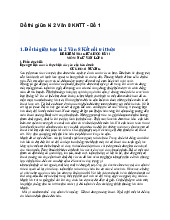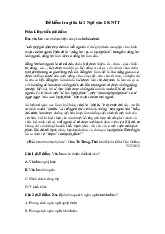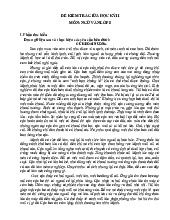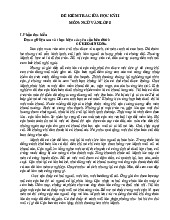









Preview text:
.......... SECONDARY SCHOOL
THE SECOND MID-TERM TEST SCHOOL YEAR: 2023-2024 Grade 8
Full name: ………………..........…… Time: 45 minutes Class: 8A … A. Phonetics
I. Choose the word whose underlined part is pronounced differently. 1. A. listened B. opened C. wanted D. lived 2. A. mind B. bike C. tradition D. tidy
II. Choose the word whose stress is different from the others. 3. A. prehistoric B. economic C. optimistic D. linguistic 4. A. geography B. photography C. biography D. historiography 5. A. employee B. adoptee C. addressee D. interviewee
B. Vocabulary and Grammar
I. Choose the best answer
6. It won’t be possible to save the Earth if we don’t take……….. right now. A. action B. job C. work D. duty
7. Environmental . ……….. is a big problem in large cities nowadays. A. dirty B. pollution C. research D. dust
8. The Sydney Opera House is an ……….. of Australia’s creative and technical achievement. A. orchestra B. emblem C. icon D. armorial
9. Singapore is famous .... ……its clean streets with many green trees. A. in B. for C. with D. up
10. Our natural ...... ……….. need conserving for our future generation. A. forests B. substances C. resources D. trees
11. The floods have killed hundreds and made thousands people ……………………. A. homely B. homeland C. homeless D. homesick
12. If the climate ……………., we will meet with natural disasters. A. to change B. changes C. changed D. had changed
13. If I………. newspapers, I……… what was happening in the world. A. didn't read/ wouldn't know B. don't read/ wouldn't know C. didn't read/ won't know D. read/ wouldn't know
14. According to the schedules, Frozen………….at 5.15 p.m. A. to start B. starts C. started D. starting
15. Water pollution is the ……… in the lake which has made the fish die. A. contaminate
B. contaminated C. contaminating D. contamination
16. The people ………….. about the possibility of a tsunami by the government. A. wasn’t warned
B. weren’t warned C. wasn’t being warned D. being warned
17. By the end of last semester, we ……………. book IV. A. have finished B. have been finished C. had finished D. had been finished
II. Find out the mistakes
18. Man is constantly being doing harm to the environment. A B C D
19. The earth is being threaten and the future looks bad. A B C D
20. If we don’t hurry up, we will be late to the concert. A B C D C. Reading:
I. Read the passage, choose the best answer.
A tsunami is a chain of fast moving waves in the ocean caused by powerful earthquakes or
volcanic eruptions. Tsunami has a very long wave. It can be hundreds of kilometers (21)
…………….. Usually, tsunami starts suddenly. The waves travel (22) ……………. a great
speed across an ocean with little energy loss. They can remove sand from beaches, destroy trees,
damage houses and even destroy whole towns.
The water will draw back from the coast half of the wave period prior to the wave getting to
the coast. If the slope of the coast is not deep, the water may (23) ……………. for hundreds of
metres. People who do not know of the danger will often remain at the shore.
Tsunamis cannot (24) …………….. However, there are ways to help stop people from
dying from a tsunami. Some (25) …………….with lots of tsunamis may use warning systems
which may warn the population before the big waves reach the land. Because an earthquake that
caused the tsunami can be felt before the wave gets to the shore, people can be warned to go somewhere safe. 21. A. long B. far C. wide D. large 22. A. from B. of C. at D. in 23. A. rise B. raise C. arise D. rising 24. A. prevent B. preventing C. prevention D. be prevented 25. A. traps B. areas C. land D. waves
II. Read the passage, answer the questions by choosing A, B, C or D.
There are more than 3,000 languages in the world today, but only about six are major
languages of the world. Two-thirds of the world’s populations speak those six languages. More
than 300,000,000 people speak English as their first or native language. No one knows how
many people speak it as a foreign language. Chinese is the only language with more speakers
than English. This is because of the huge population of China, more than one billion people.
English is the native or official language on one-fifth of the land area of the world. It is
spoken in North America, Great Britain, Australia and New Zealand. In South Africa and India,
it is one of the official languages.
More people study English than any other language. In many countries, the textbooks in
universities are in English. Many university classes are taught in English even though the native
language is not English. English is the language of international communication. It is the
language of international business, research, and science. More than three-fourths of the world’s
mails are written in English. More than three-fifths of the world’s radio stations use English.
More than half of the scientific and research journals are in English. Most other languages have borrowed many English words.
26. What language has the most speakers in the world?
A. The English has the most speakers in the world.
B. The Chinese has the most speakers in the world.
C. The Indian has the most speakers in the world.
D. The Australian has the most speakers in the world.
27. How many people speak English as a native or first language?
A. More than 200,000,000 people
B. More than 300,000,000 people
C. More than 500,000,000 people
D. More than 800,000,000 people
28. Are Chinese and Arabic probably major languages of the world?
A. Chinese is one of the major languages of the world but Arabic probably is not
B. Chinese is not one of the major languages of the world but Arabic probably is.
C. Chinese is one of the major languages of the world and Arabic probably is not
D. Chinese is one of the major languages of the world but Arabic probably is.
29. What percent of the world’s radio stations are in English?
A. More than three-fourth of the world’s radio stations use English.
B. More than three-five of the world’s radio stations use English.
C. More than three-fifths of the world’s radio stations use English.
D. More than three-fifth of the world’s radio stations use English.
30. Why do some countries use English textbooks even though English is not the native language?
A. More than half of the scientific and research journals are in English.
B. More than two half of the scientific and research journals are in English.
C. More than two halves of the scientific and research journals are in English.
D. More than halves of the scientific and research journals are in English. D. Writing
I. Choose the letter A, B, C or D to complete the sentences with given words.
31. There/ many/ English/ speaking countries/ the world
A. There are many English speaking countries on the world.
B. There are many English speaking countries in the world.
C. There are many English speaking countries at the world.
D. There are many English speaking countries of the world.
32. Could/ you/ tell/ me/ what/ the symbol/ Scotland?
A. Could you tell to me what is the symbol of Scotland?
B. Could you tell to me what the symbol of Scotland is?
C. Could you tell me what is the symbol of Scotland?
D. Could you tell me what the symbol of Scotland is?
33. Fifty stars/ the/ United States’ flag/ represent/ fifty states
A. Fifty stars in the United States’ flag represents its fifty states.
B. Fifty stars at the United States’ flag represents its fifty states.
C. Fifty stars at the United States’ flag represent its fifty states.
D. Fifty stars in the United States’ flag represent its fifty states.
34. What/ icon/ your/ country?
A. What is the icon of your country?
B. What is an icon of your country?
C. What is the icon to your country?
D. What is an icon to your country?
35. A lot of/ people/ enjoy/ see/ ‘Titanic’/ despite/ sad ending.
A. A lot of people enjoy to see ‘Titanic’ despite its sad ending.
B. A lot of people enjoy to see ‘Titanic’ despite it has sad ending.
C. A lot of people enjoy seeing ‘Titanic’ despite it has sad ending.
D. A lot of people enjoy seeing ‘Titanic’ despite its sad ending.
II. Rewrite the sentences without changing the meaning.
36. When did you start the project?
A. How long you started the project?
B. How long have you done the project?
C. How long did it start since you start the project?
D. How long have you started the project?
37. We haven’t got a calculator, so we can’t work this out quickly.
A. If we had a calculator, we could work this out quickly.
B. If we have a calculator, we could work this out quickly.
C. If we had had a calculator, we could work this out quickly.
D. If we have had a calculator, we could work this out quickly.
38. I'm often tired in the morning because I go to bed late.
A. If I didn’t go to bed late, I wouldn’t be often tired in the morning.
B. If I'm often tired in the morning, I will go to bed late.
C. I wouldn’t be often tired in the morning if I didn’t go to bed late. D. A and C are correct.
39. Dumping solid wastes in rivers, lakes and oceans causes water pollution.
A. Dumping solid wastes leads to water pollution in rivers, lakes and oceans.
B. Dumping solid wastes lead to water pollution in rivers, lakes and oceans.
A. Dumping solid wastes led to water pollution in rivers, lakes and oceans.
A. Dumping solid wastes leading to water pollution in rivers, lakes and oceans.
40. Martin may not be very well but he still manages to enjoy life.
A. Martin's poor health don’t prevent him (from) enjoying life.
B. Martin's poor health can't prevent him (from) enjoying life.
C. Martin's poor health not stop him (from) enjoying life.
D. Martin's poor health couldn’t prevent him (from) enjoying life. ----The end----
.......... SECONDARY SCHOOL ANSWER KEY FOR SCHOOL YEAR: 2023-2024
THE SECOND MID-TERM TEST Grade 8 Time: 45 minutes A. Phonetics
I. Choose the word whose underlined part is pronounced differently. 1. A. listened B. opened C. wanted D. lived 2. A. mind B. bike C. tradition D. tidy
II. Choose the word whose stress is different from the others. 3. A. prehistoric B. economic C. optimistic D. linguistic 4. A. geography B. photography C. biography D. historiography 5. A. employee B. adoptee C. addressee D. interviewee
B. Vocabulary and Grammar
I. Choose the best answer
6. It won’t be possible to save the Earth if we don’t take……….. right now. A. action B. job C. work D. duty
7. Environmental . ……….. is a big problem in large cities nowadays. A. dirty B. pollution C. research D. dust
8. The Sydney Opera House is an ……….. of Australia’s creative and technical achievement. A. orchestra B. emblem C. icon D. armorial
9. Singapore is famous .... …..its clean streets with many green trees. A. in B. for C. with D. up
10. Our natural ...... ……….. need conserving for our future generation. A. forests B. substances C. resources D. trees
11. The floods have killed hundreds and made thousands people ……………………. A. homely B. homeland C. homeless D. homesick
12. If the climate ……………., we will meet with natural disasters. A. to change B. changes C. changed D. had changed
13. If I………. newspapers, I……… what was happening in the world.
A. didn't read/ wouldn't know B. don't read/ wouldn't know C. didn't read/ won't know D. read/ wouldn't know
14. According to the schedules, Frozen…………. at 5.15 p.m. A. to start B. starts C. started D. starting
15. Water pollution is the ……… in the lake which has made the fish die. A. contaminate
B. contaminated C. contaminating D. contamination
16. The people ………….. about the possibility of a tsunami by the government. A. wasn’t warned
B. weren’t warned C. wasn’t being warned D. being warned
17. By the end of last semester, we ……………. book IV. A. have finished B. have been finished C. had finished D. had been finished
II. Find out the mistakes
18. Man is constantly being doing harm to the environment. A B C D
19. The earth is being threaten and the future looks bad. A B C D
20. If we don’t hurry up, we will be late to the concert. A B C D C. Reading:
I. Read the passage, choose the best answer.
A tsunami is a chain of fast moving waves in the ocean caused by powerful earthquakes or
volcanic eruptions. Tsunami has a very long wave. It can be hundreds of kilometers (21)
…………….. Usually, tsunami starts suddenly. The waves travel (22) ……………. a great
speed across an ocean with little energy loss. They can remove sand from beaches, destroy trees,
damage houses and even destroy whole towns.
The water will draw back from the coast half of the wave period prior to the wave getting to
the coast. If the slope of the coast is not deep, the water may (23) ……………. for hundreds of
metres. People who do not know of the danger will often remain at the shore.
Tsunamis cannot (24) …………….. However, there are ways to help stop people from
dying from a tsunami. Some (25) ……………. with lots of tsunamis may use warning systems
which may warn the population before the big waves reach the land. Because an earthquake that
caused the tsunami can be felt before the wave gets to the shore, people can be warned to go somewhere safe. 21. A. long B. far C. wide D. large 22. A. from B. of C. at D. in 23. A. rise B. raise C. arise D. rising 24. A. prevent B. preventing C. prevention D. be prevented 25. A. traps B. areas C. land D. waves
II. Read the passage, answer the questions by choosing A, B, C or D.
There are more than 3,000 languages in the world today, but only about six are major
languages of the world. Two-thirds of the world’s populations speak those six languages. More
than 300,000,000 people speak English as their first or native language. No one knows how
many people speak it as a foreign language. Chinese is the only language with more speakers
than English. This is because of the huge population of China, more than one billion people.
English is the native or official language on one-fifth of the land area of the world. It is
spoken in North America, Great Britain, Australia and New Zealand. In South Africa and India,
it is one of the official languages.
More people study English than any other language. In many countries, the textbooks in
universities are in English. Many university classes are taught in English even though the native
language is not English. English is the language of international communication. It is the
language of international business, research, and science. More than three-fourths of the world’s
mails are written in English. More than three-fifths of the world’s radio stations use English.
More than half of the scientific and research journals are in English. Most other languages have borrowed many English words.
26. What language has the most speakers in the world?
A. The English has the most speakers in the world.
B. The Chinese has the most speakers in the world.
C. The Indian has the most speakers in the world.
D. The Australian has the most speakers in the world.
27. How many people speak English as a native or first language?
A. More than 200,000,000 people
B. More than 300,000,000 people
C. More than 500,000,000 people
D. More than 800,000,000 people
28. Are Chinese and Arabic probably major languages of the world?
A. Chinese is one of the major languages of the world but Arabic probably is not
B. Chinese is not one of the major languages of the world but Arabic probably is.
C. Chinese is one of the major languages of the world and Arabic probably is not
D. Chinese is one of the major languages of the world but Arabic probably is.
29. What percent of the world’s radio stations are in English?
A. More than three-fourth of the world’s radio stations use English.
B. More than three-five of the world’s radio stations use English.
C. More than three-fifths of the world’s radio stations use English.
D. More than three-fifth of the world’s radio stations use English.
30. Why do some countries use English textbooks even though English is not the native language?
A. More than half of the scientific and research journals are in English.
B. More than two half of the scientific and research journals are in English.
C. More than two halves of the scientific and research journals are in English.
D. More than halves of the scientific and research journals are in English. D. Writing
I. Choose the letter A, B, C or D to complete the sentences with given words.
31. There/ many/ English/ speaking countries/ the world
A. There are many English speaking countries on the world.
B. There are many English speaking countries in the world.
C. There are many English speaking countries at the world.
D. There are many English speaking countries of the world.
32. Could/ you/ tell/ me/ what/ the symbol/ Scotland?
A. Could you tell to me what is the symbol of Scotland?
B. Could you tell to me what the symbol of Scotland is?
C. Could you tell me what is the symbol of Scotland?
D. Could you tell me what the symbol of Scotland is?
33. Fifty stars/ the/ United States’ flag/ represent/ fifty states
A. Fifty stars in the United States’ flag represents its fifty states.
B. Fifty stars at the United States’ flag represents its fifty states.
C. Fifty stars at the United States’ flag represent its fifty states.
D. Fifty stars in the United States’ flag represent its fifty states.
34. What/ icon/ your/ country?
A. What is the icon of your country?
B. What is an icon of your country?
C. What is the icon to your country?
D. What is an icon to your country?
35. A lot of/ people/ enjoy/ see/ ‘Titanic’/ despite/ sad ending.
A. A lot of people enjoy to see ‘Titanic’ despite its sad ending.
B. A lot of people enjoy to see ‘Titanic’ despite it has sad ending.
C. A lot of people enjoy seeing ‘Titanic’ despite it has sad ending.
D. A lot of people enjoy seeing ‘Titanic’ despite its sad ending.
II. Rewrite the sentences without changing the meaning.
36. When did you start the project?
A. How long you started the project?
B. How long have you done the project?
C. How long did it start since you start the project?
D. How long have you started the project?
37. We haven’t got a calculator, so we can’t work this out quickly.
A. If we had a calculator, we could work this out quickly.
B. If we have a calculator, we could work this out quickly.
C. If we had had a calculator, we could work this out quickly.
D. If we have had a calculator, we could work this out quickly.
38. I'm often tired in the morning because I go to bed late.
A. If I didn’t go to bed late, I wouldn’t be often tired in the morning.
B. If I'm often tired in the morning, I will go to bed late.
C. I wouldn’t be often tired in the morning if I didn’t go to bed late.
D. A and C are correct.
39. Dumping solid wastes in rivers, lakes and oceans causes water pollution.
A. Dumping solid wastes leads to water pollution in rivers, lakes and oceans.
B. Dumping solid wastes lead to water pollution in rivers, lakes and oceans.
A. Dumping solid wastes led to water pollution in rivers, lakes and oceans.
A. Dumping solid wastes leading to water pollution in rivers, lakes and oceans.
40. Martin may not be very well but he still manages to enjoy life.
A. Martin's poor health don’t prevent him (from) enjoying life.
B. Martin's poor health can't prevent him (from) enjoying life.
C. Martin's poor health not stop him (from) enjoying life.
D. B. Martin's poor health couldn’t prevent him (from) enjoying life. ----The end----




